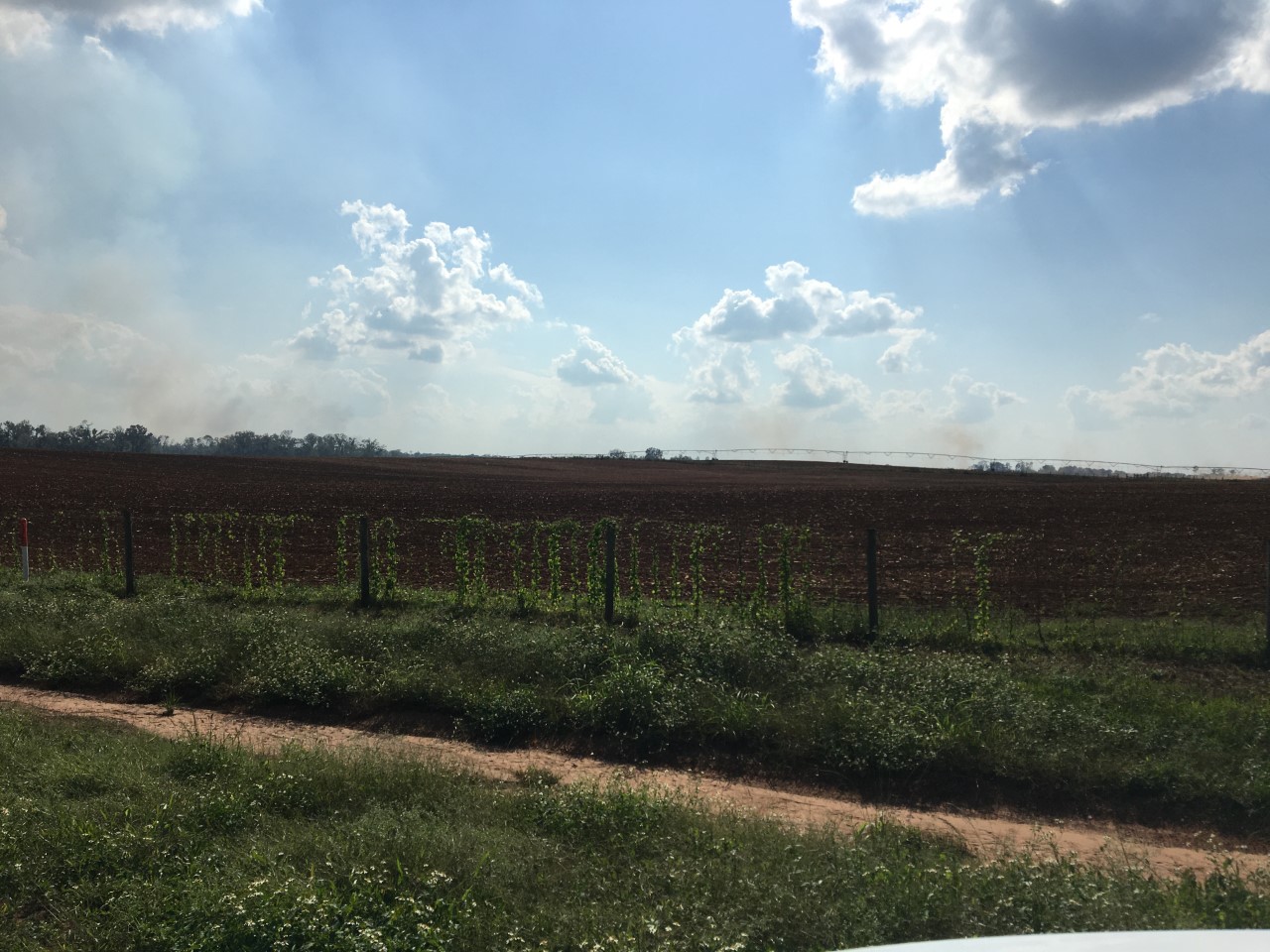From July 2, 2017:
“On March 20,1997, as I drove home from a work appointment God directed my attention to this field, freshly plowed, along the roadside of Highway 231 South, just north of Cottondale. As I glanced toward it, God suddenly spoke in my heart, “This is you.” It was so clear and piqued my interest. When I got home I read a number of scriptures about ploughed fields, the land, etc. 1 Corinthians 3:9 says,” For we are co-workers in God’s service; you are God’s field, God’s building.” It doesn’t get much clearer than that! The next day I drove back there, stood on top of my car, and took this photo.
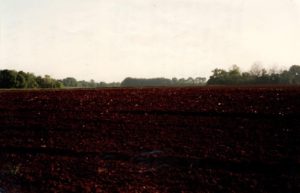
March 20, 1997
I had been in a place in my life, at 43 years old, of feeling that my best years were behind me. I had been grieving and feeling unfulfilled and suffering from a lengthy depression, although I didn’t realize it at the time. Suddenly, the Lord had shown me that, although I seemed to have been fallow for a while, there was another harvest in my life being prepared. 12 years later, on April 9, 2009. as I drove our Birmingham grandchildren home one day, Brady, who was 4 years old, said, “Look, Gigi, that’s a pretty field.” I looked to see what he was talking about and it was this same field through which God had spoken to me about preparing me for another harvest. It had been fenced in and turned into a beautiful pasture with white cows grazing owned by Southern Cattle Co. I had written on the back of the picture about his observation and how it spoke to my heart once again about that same field. This weekend I shared this story with him and showed him this picture and my note about his comment on the back. Tomorrow as I take him to meet his Mother, he said he’d like to go home that way, which we rarely do anymore, and see the field. We will stop and take a picture of what it looks like today. My heart is full. I have such joy in my life, knowing that was a new beginning for me. I have so much to cherish that God has done, is doing, and ways in which I am privileged to be used by him. There have been times when it was hard and, like Psalm 129:6, a psalm of persecution and pain, I have felt the blade of being further prepared, “Plowmen have plowed my back and made their furrows long.” But I know that, even as the soil is turned in my life by such work, it simply means that more harvests will come! And no matter what, the land will not be destroyed. I am a co-worker in God’s service; I am God’s field!
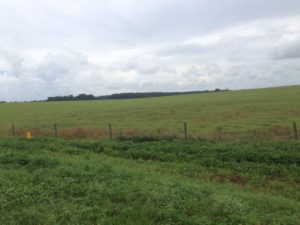
Field under pasture July 2, 2017
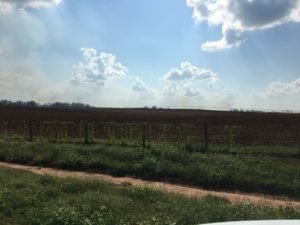
Field under new cultivation again July 2, 2022
We sometimes speak of circumstances being “harrowing”: to disturb keenly or painfully; distress the mind, feelings, etc., of…….or…. to become broken up by harrowing, as soil. Origin of the word is from a Greek word for “sickle.” (dictionary.com). On several occasions after particularly “harrowing” seasons of my life, when the plowman’s blades upon my back were acutely felt, I have had the Lord ask me outright, “Do you feel abused?” Always, my answer has been, “Never! I am yours, Lord, to be used any way you choose.” And even in the midst of those “harrowing” seasons, I always felt God’s protective hand, his comfort and reassurance that the harvest would be worth the distress of the preparation in turning the soil. At one point, actually in 1997 just 2 months after showing me this vision of the land, on May 24, in a state of acute distress I heard the Lord speak in my spirit, “If this is too hard you don’t have to do it.” My response then and every time since then when God has given me an occasion to “opt out”, has been and continues to be, “I can endure whatever comes. I want to be there for those you are bringing for me to serve.”
Today- July 2,2022:
During that harrowing time between March 20 and May 24, as I sat talking to the Lord one day, I felt on my spirit dust and wind swirling around me, and myself feeling like a stone being unearthed and exposed, I heard from a neighbor’s yard the sound of a skill saw. Every time the saw’s blade ripped through whatever was being cut- boards or tiles- in my mind’s eye I saw and heard the word “Cleveland”. It was curious and strange to “see” that word as if it were stamped upon my forward and I was looking at it there.
I did not have the sense that it related to a city in Ohio, but that it was actually “cleve land” and meant “tearing land apart.” The way my life was during those weeks, it certainly felt like that might be the case. Then I looked up the words “cleve” and “cleave” and discovered an even more curious thing
The word that I was thinking of was “cleave” although I had seen it as “cleve” . If hearing it alone I would have been confused about the word. To see it and hear in my mind did not help my confusion.
“Cleave” is a verb that can actually have either of two meanings and oddly enough, they are opposite meanings.
Now, as I approach the date of our 50th anniversary, July 22,2022, I do so as a widow, Bill having died August 6, 2020, two weeks after our 48th anniversary which we spent together at home in the throes of each of us having contracted COVID-19. It was another hard season in our lives, one could say harrowing for both of us. In the time since Bill’s death I have come to recognize the signs of another tilling, perhaps another harvest or perhaps just turning over the remnants of the last harvest to be returned to the earth and myself lying fallow. I do not know what lies ahead, but I do know I am not alone. Bill’s presence through the memories of him in my spirit and the Living Christ with me in His, I will continue walking the fields that lie between here and home
I returned to the imagery of a plowed field today and wondered just what a ploughshare, or plowshare is. lt is a detachable, replaceable blade component of a plow (#5/6) attached to the moldboard (#7) There is another vertical knife-like blade, called a “coulter”, The coulter is also sometimes referred to as a “plowshare”, both being sharpened blades that dig the soil. The coulter is shown below in red (#4) in front of the pointed leading edge of the plowshare (#5/6) on the front edge of the curved and widening moldboard (#7). These parts together constitute the plow. The coulter sets the furrow, marking the row, into which the leading pointed plowshare tip and the moldboard of the plow will burrow and dig out the earth, pushing the dirt up over the curving sides to make the space for the seeds to be planted at the proper depth. One or more coulter knife-like blades dig to a shallower depth that is adjustable based on soil conditions, generally about 7 inches, that prepares the way for the plowshare and moldboard to dig deeper and make the furrowed trench. The coulter may also be a warning indicator that a rock or root lies in the way, blended in with the soil or lying just beneath it. The coulter, because it is the first point of contact with the ground and is detachable for replacement, can spare the pointed blade of the plowshare itself some of the blunt force impact from constantly breaking up winter snow and spring rain hardened fields.
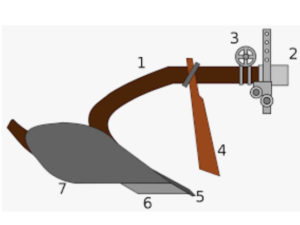
As I reflect on the intricacies of the plow and its components and biblical terms in God’s Word, it seems to me that those who preach and teach the Word are like “coulters” (which can also be thought of as precursors of the ploughshare itself, that prepare the way for the Word. In our metaphor Jesus Christ, the fulfillment of the written Word by which He is revealed and made known by the Holy Spirit (moldboard) which assists us in understanding and obedience toward the purpose of being furrowed soil seed-bearers.
The Word of God, the Bible, arising from Holy Spirit inspired minds and hands of witnesses to God’s Presence with His people serves as the Source for the expectation of Messiah, the revelation of Christ and the measure of the Person of Jesus Christ as the fulfillment of Messiah( called the Christ). The Bible is also at times compared to a knife, a sword, a scalpel, and can certainly also be related to a sickle for harvesting.
Addendum: July 12, 2022
Just yesterday I was thinking about my first “season” of being aware that I was a “plowed field” in 1997. During that time there were many words and phrases that God spoke into my heart and mind. It was overwhelming at times and, although I tried to sort it all out over the years. Even today, 25 years later, God is still bringing those words to mind and giving them fresh new context and meaning. One of the words that frequently came to me then and returned yesterday stirring some new curiosity was “ard.” With the limited knowledge of language that I had, it seemed to me that it was an English suffix… as in “drunkard”, or “ballard” or “sluggard” or in other words to indicate a characteristic action, or habit of someone. And when I had looked it up that was the primary use, as a suffix to indicate a quality or action. But yesterday, when it came to mind again, I researched more and suddenly came across another meaning, a more relevant meaning in the context of how God had been speaking to me then and again now after all these years. The word ard is from a 20th century adaptation of a Norwegian word for “plough” and is a simple kind of plow that consists of a spike that is drug through the ground. In Gaelic, ard means the “bend between the heights.” Certainly, if one is trying to break up dirt to plant in narrow rocky spaces between rises in mountainous areas, a simple one blade plow might work better than the double blade, deeper and wider moldboard style plow.
The Lord is a patient instructor and will continue to repeat his lessons until my maturity, experience, and wisdom can grasp the fullness of his work through this field and this imagery over the years. Praise the Lord for his patience and his faithfulness across all time!
It is interesting to reflect on theses aspects of the agrarian traditions of the culture and people from which a Jesus Christ came.
Isaiah 2:4
He shall judge between the nations, and shall decide disputes for many peoples; and they shall beat their swords into plowshares, and their spears into pruning hooks; nation shall not lift up sword against nation, neither shall they learn war anymore.
Micah 4:3
He shall judge between many peoples, and shall decide for strong nations far away; and they shall beat their swords into plowshares, and their spears into pruning hooks; nation shall not lift up sword against nation, neither shall they learn war anymore;
Joel 3:10
Beat your plowshares into swords, and your pruning hooks into spears; let the weak say, “I am a warrior.”
Isaiah 2:1-22
The word that Isaiah the son of Amoz saw concerning Judah and Jerusalem. It shall come to pass in the latter days that the mountain of the house of the Lord shall be established as the highest of the mountains, and shall be lifted up above the hills; and all the nations shall flow to it, and many peoples shall come, and say: “Come, let us go up to the mountain of the Lord, to the house of the God of Jacob, that he may teach us his ways and that we may walk in his paths.” For out of Zion shall go the law, and the word of the Lord from Jerusalem. He shall judge between the nations, and shall decide disputes for many peoples; and they shall beat their swords into plowshares, and their spears into pruning hooks; nation shall not lift up sword against nation, neither shall they learn war anymore. O house of Jacob, come, let us walk in the light of the Lord. …
Psalm 46:9
He makes wars cease to the end of the earth; he breaks the bow and shatters the spear; he burns the chariots with fire.
![MPj04389070000[1]_phixr](http://disciplerofself.com/wp-content/uploads/2015/03/MPj043890700001_phixr.png)
